How your gut health affects your weight
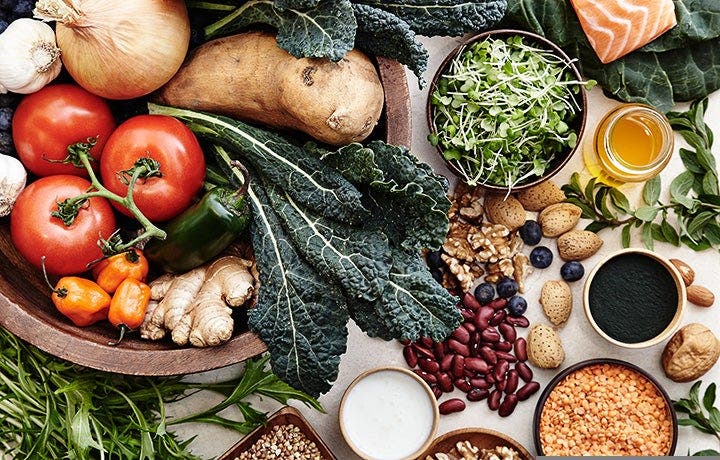
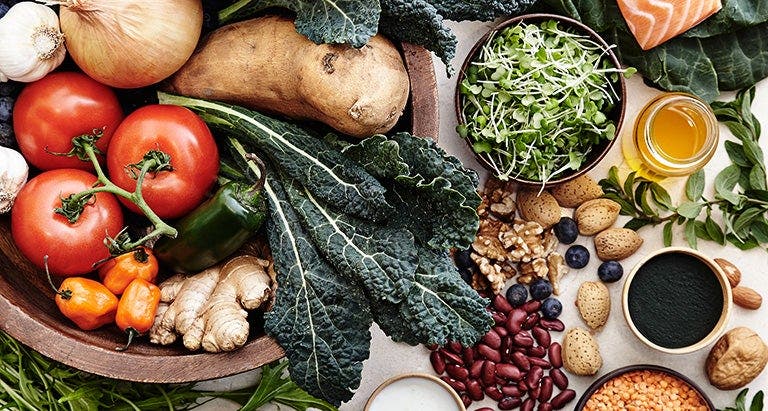
In this article:
2/ How your gut health affects your weight
3/ Tending your bacterial garden
4/ 6 ways to improve gut health for weight loss
5/ The bottom line
At first glance, gut health and weight loss seem like pretty separate concepts. Your gut health has to do with your digestive tract and the kinds of bacteria that live there, while weight loss is all about food choices and movement, right? Well the two might be more connected than you’d initially think. Here’s how.
What are gut bacteria?
Turns out, your gut may be good for more than giving you a reality check in stressful situations. A vast ecosystem of trillions of microbes, known as your gut microbiome, resides inside your belly. A combination of more than 5,000 species, these bacterial cells outnumber the rest of your cells 10 to 1. They’re the ultimate multitaskers, playing a role in predigesting food (which makes it easier for your body to absorb nutrients) and ensuring your gastrointestinal system runs smoothly. Plus, they help your immune system fend off foreign invaders like the influenza virus. In fact, about 70 to 80 percent of your immune system lies right there, in your belly. And scientists are realizing your gut may have even more influence over your health than they’d thought.
“There’s been an explosion in research showing how the bacteria in our gut can influence nutrient absorption, cardiovascular risk, autoimmune disease, and even our mood,” says Dr. David Rakel, M.D., chair of the Department of Family and Community Medicine at the University of New Mexico School of Medicine. By all accounts, these are hard-working bugs—in often surprising ways.
Emerging research pointing to a potential brain-gut connection hints that probiotic foods and supplements rich in the healthy bacteria your body needs may one day be used to help treat depression. A small 2015 UK study found that healthy volunteers who consumed prebiotics — high-fiber carbohydrates that serve as fuel for probiotics—had lower levels of the stress hormone cortisol in their saliva than those who weren’t taking prebiotics, and their attention to positive versus negative stimuli was similar to that seen in individuals taking antidepressant or antianxiety medication.
Must Read: Your Mental Health Day Guide
How your gut health affects your weight
Your microbiome can also lay the groundwork for weight gain or loss.
Gut health and weight gain
Experts are beginning to suspect that gut bacteria — specifically, a lack of diversity in the microbiome — could drive junk-food cravings, says Wendy Bazilian, R.D., a San Diego–based nutritionist and author of Eat Clean, Stay Lean. “The emerging theory is that having only a few types of bacteria in your belly gives each one more influence, making it easier for those bacteria to organize and send signals to the brain that prompt you to eat the unhealthy foods they want,” she says. But when the gut boasts ample bacterial diversity, “No single strain is strong enough to exert its sugar-seeking power.” As New York City-based internist Dr. Raphael Kellman, M.D., author of The Whole Brain: The Microbiome Solution to Heal Depression, Anxiety, and Mental Fog Without Prescription Drugs, puts it, “An unhealthy microbiome might hijack your cravings.”
Gut health and weight loss
“People who eat lots of saturated fat tend to have more bacteria called Firmicutes, among others, which are more efficient at absorbing calories from food,” Rakel explains. (Not the kind of efficiency most of us are hoping for.) “When they switch to a Mediterranean diet, with lots of colorful produce, whole grains, beans, and little meat, their level of Firmicutes goes down and their microbiome shifts toward one that is less efficient at storing energy, making it easier to stay lean.” Indeed, a 2017 International Journal of Obesity study found that the presence of a diverse array of gut bacteria was correlated with less weight gain in the long-term.
Tending your bacterial garden
This microscopic world in your belly is sometimes referred to as “the garden within,” in part because of the wide variety of bacteria living and working together in harmony. But as robust as these bacteria are — strong enough to survive in the highly acidic contents that leave the stomach and make their way into the small and large intestines, where the bacteria live — the gut microbiome itself is surprisingly delicate. Just as an untended backyard garden can swiftly become overgrown with weeds, certain conditions, such as a low-fiber, high-sugar diet, chronic stress, or a course of antibiotics, “might allow harmful bacteria, like salmonella or pseudomonas, yeast, and parasites to flourish and cause damage,” says Dr. Susan Blum, M.D., assistant clinical professor of preventive medicine at the Icahn School of Medicine at Mount Sinai in New York, and author of The Immune System Recovery Plan.
Your microbiome is established early on, heavily influenced by how you were born and whether you were fed breast milk or formula. (Vaginal delivery allows a mother to pass along her own microbes, mainly lactobacillus, which flourish in the birth canal; breastfeeding transmits bifidobacterium and other healthy bacteria through the milk as well as through contact with the mother’s skin.)
From that point on, your diet becomes the most important factor in shaping and influencing the type and quality of bacteria governing your health, Rakel says. While researchers don’t yet know enough to be able to say definitively that through eating a lot of this kind of bacteria you’ll lose weight, solve GI issues, or resolve other problems, they agree that all-around good gut balance should be a priority for reaping multiple health-related benefits. Here’s how to make your microbiome flourish.
RELATED: What to Eat on WeightWatchers®
6 ways to improve gut health for weight loss
The best way to enhance and diversify your gut-friendly flora is to eat a wide variety of fiber-rich, plant-based foods, along with adding at least one serving daily of natural sources of probiotics such as fermented foods. Use the following suggestions to help your flora flourish.
Make friends with fermentation.
Probiotic standouts include fermented vegetables like kimchi and sauerkraut; kefir (a drinkable cultured dairy beverage) and yogurt; kombucha tea; and fermented soy products such as miso soup, soy milk, soy sauce, and soy-based meat substitutes like tofu and tempeh. It’s too early to offer a specific prescription, but experts agree that huge portions aren’t necessary to receive the benefits. Blum says a tablespoon of fermented beets, for instance, used as a condiment on a salad, is all you need to seed your gut with a daily dose of good gut bugs.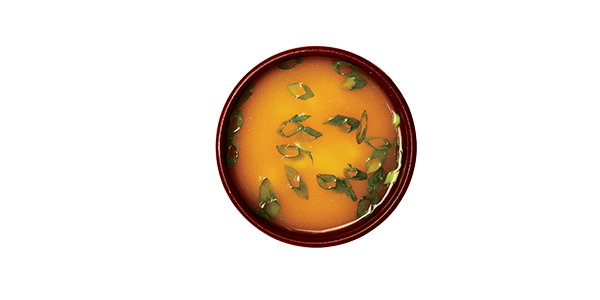 Bazilian notes that when buying yogurt and kefir, you should look for the words “live and active cultures” on the label, which ensures you’re getting the bacteria you want. Avoid varieties with more than 10 grams of added sugar per serving — the sweet stuff is a well-known microbiome saboteur — or with artificial sweeteners like aspartame or sucralose. “Just a small amount, the equivalent of a couple of packets, can negatively impact your gut,” Bazilian says.
Bazilian notes that when buying yogurt and kefir, you should look for the words “live and active cultures” on the label, which ensures you’re getting the bacteria you want. Avoid varieties with more than 10 grams of added sugar per serving — the sweet stuff is a well-known microbiome saboteur — or with artificial sweeteners like aspartame or sucralose. “Just a small amount, the equivalent of a couple of packets, can negatively impact your gut,” Bazilian says.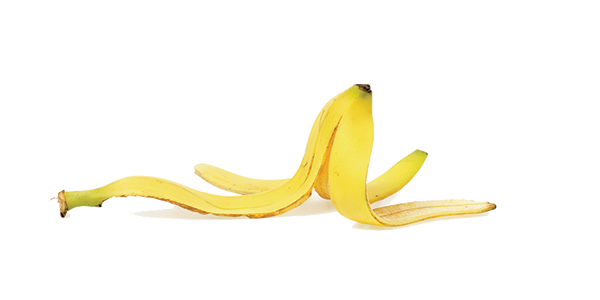
Eat more prebiotics
Next, feed those probiotics with plenty of prebiotics: Bananas, oats, and whole grains, beans, cruciferous vegetables (cauliflower, broccoli, cabbage, radishes), artichokes, and, as Rakel cheekily puts it, “foods that make you smell a little, like onion, garlic, and asparagus,” all work synergistically with probiotics to amplify their effects. You needn’t consume prebiotics and probiotics simultaneously, but they can certainly work well together: a banana and kefir smoothie; broccoli, asparagus, and tempeh stir-fry; Brussels sprouts topped with kimchi. Cooking destroys some prebiotics, so enjoy these foods raw whenever possible; when it’s not, light steaming can minimize the loss.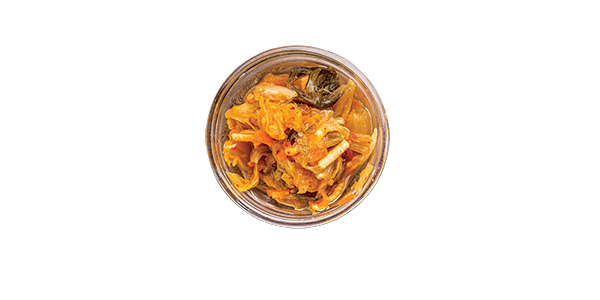
Boost your fiber intake
Nearly all prebiotic foods are high in fiber, which helpful bacteria love to feast on. “When gut microbes feed on fiber, they produce short-chain fatty acids,” Kellman explains. “Those are then absorbed into the bloodstream, where they work to regulate the immune system and reduce inflammation.” Fiber also stimulates the production of mucus in the gut, which acts like a healthy home for friendly bugs, similar to a plush uterine lining nourishing an embryo. “This mucus acts like a playing field for immune cells to interact with bacteria,” Rakel says. “It also creates a protective buffer so the bacteria don’t eat away at your intestinal lining.
The Academy of Nutrition and Dietetics recommends that women aim for 25 grams of fiber per day; men, 38 grams. (Over age 50? The goals are 21 and 30 grams daily, respectively.)
Reach for real food.
Finally, try to get your probiotics from food, not supplements, as much as possible. “It’s not just about the bacteria — it’s how the bacteria interact with the foods they’re found in,” Rakel explains. A perfect example: Dairy helps protect friendly bacteria as they make their way down to the intestines. If you just eat well, the microbiome will take care of itself,” he says.
Avoid processed and sugary foods
Research suggests that many of the ingredients of ultra-processed foods, including additives and sweeteners, change your microbiome for the worse and result in high levels of inflammation in your gut. Rethink how often you consume sodas, mass-produced snack items, processed meats, and other foods that contain a lot of added ingredients.
Get quality sleep
Here’s something you can do that has nothing to do with your diet. Developing healthy sleep habits — getting enough sleep each night, going to bed and waking up around the same time every day — can help keep your gut bacteria in balance. And the benefits go in both directions: A healthy microbiome can also improve your sleep, making it easier to get good rest in the future.
The bottom line
The bacteria in your gut may be the only bugs you’ll ever willingly (purposely!) cultivate. Having a healthy microbiome can help your immune system, heart health, mood, and more. To improve your gut health, eat a variety of probiotics (found in fermented foods) and prebiotics (found in high-fiber fruits and vegetables).
FAQs
While there is no specific sign, digestive symptoms like constipation, diarrhea, bloating, and abdominal pain point to your gut health being unhealthy.
This comes down to your food choices: Eat more whole foods and less ultra-processed foods, eat more fiber, and make sure to get enough prebiotics, which is a specific type of fiber that feeds healthy bacteria in your gut.
Evidence suggests that bifidobacterium and lactobacillus may be the most effective probiotics for weight loss. More research is needed to determine how much needs to be taken to see an impact.
This content is for informational purposes only and does not constitute medical advice, diagnosis or treatment. It should not be regarded as a substitute for guidance from your healthcare provider.
WeightWatchers relies on only the most trustworthy sources, including highly credentialed experts, government and academic institutions, peer-reviewed studies, and respected medical associations. We focus on primary sources and research that is recent, relevant, and high-quality. For more about how we report, write, and fact check our stories, please see our editorial policy.
